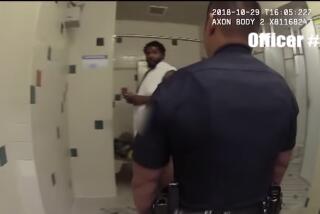Justices Bar Challenger Widow’s Suit : High court: 1950 ruling barring legal action by military personnel invoked.
- Share via
WASHINGTON — The Supreme Court today refused to revive a lawsuit by the widow of one of the seven astronauts who died when the space shuttle Challenger exploded in 1986.
The court, without comment, left intact a ruling that shields the federal government and a NASA engineer from being sued.
Navy Comdr. Michael J. Smith, was one of the seven killed when the Challenger exploded 74 seconds after its Jan. 28, 1986, launch.
His widow, Jane, sued for damages and to bar Morton Thiokol, manufacturer of the shuttle’s booster rockets, from bidding on any future National Aeronautics and Space Administration projects.
Families of the astronauts received millions of dollars in a settlement with Morton Thiokol. But Jane Smith, among those who settled with the manufacturer, continued her legal battle against the government and Lawrence Mulloy, the NASA engineer who oversaw work on the booster rocket blamed for the explosion.
“She feels that the people whose negligence caused the accident should be accountable for their actions,” said Jane Smith’s lawyer, William Maready.
The appeals court said the suit is barred under a 1950 Supreme Court decision that generally bars military personnel from suing the government over injuries suffered.
In another ruling today, the justices said that parents suspected of child abuse may be jailed indefinitely for refusing to disclose the whereabouts of their children.
The court said society’s need to protect children from harm generally outweighs a parent’s constitutional right against self-incrimination.
By a 7-2 vote, the court upheld the indefinite jailing of a Maryland woman until she tells authorities where her young son can be found. The boy is feared dead.
Justice Sandra Day O’Connor, writing for the court, said forcing parents in such cases to reveal the whereabouts of children is aimed at protecting the children and not gathering incriminating evidence.
“Even when criminal conduct may exist, a court may properly request production and return of the child . . . for reasons related entirely to the child’s well-being and through measures unrelated to criminal law enforcement or investigation,” O’Connor said.
Justices William J. Brennan and Thurgood Marshall dissented.
In other action, the court:
--Let stand a ruling that shields government social workers from being sued for placing children in foster homes where they are sexually abused.
--Allowed the federal government to withhold federal highway funds from states that do not comply with a national speed limit.
More to Read
Get the L.A. Times Politics newsletter
Deeply reported insights into legislation, politics and policy from Sacramento, Washington and beyond. In your inbox twice per week.
You may occasionally receive promotional content from the Los Angeles Times.









